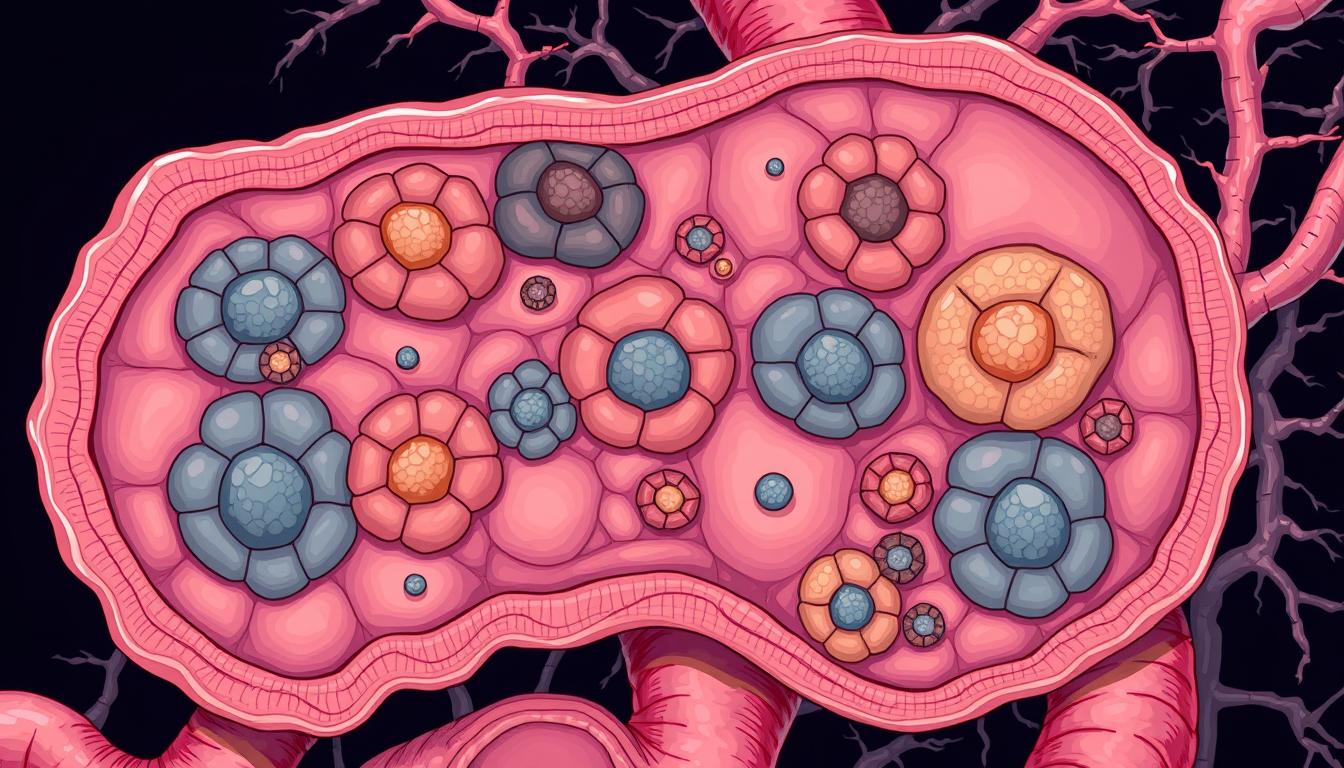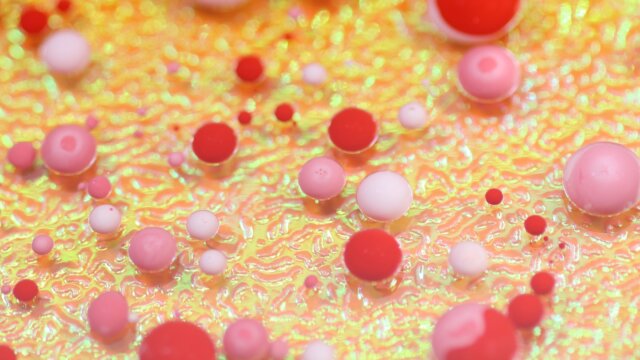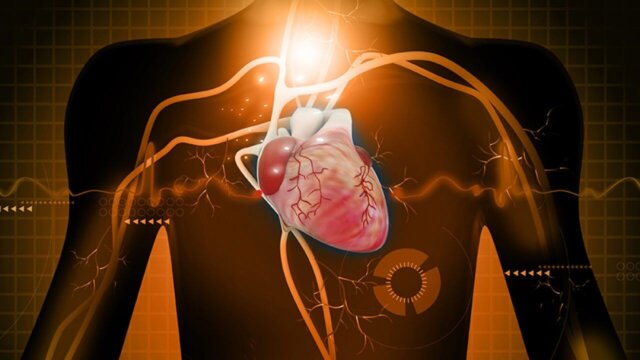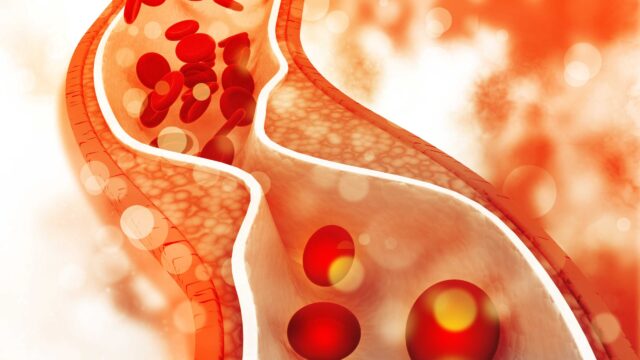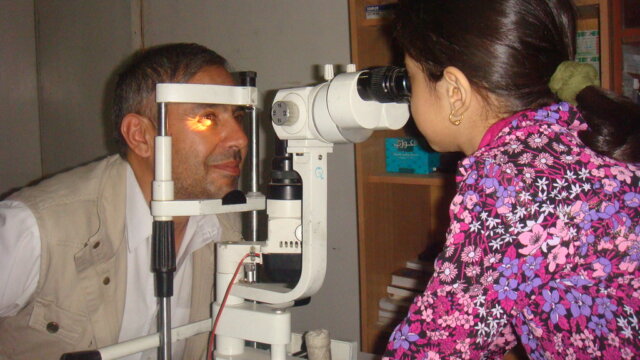FTC disclaimer: This post may contains affiliate links and we will be compensated if you click on a link and make a purchase.
Pancreatic neuroendocrine tumors are a rare cancer in the pancreas. They start from hormone-producing islet cells. Only 1,000 new cases happen each year in the United States.
These tumors can cause different symptoms based on the islet cell type. For example, insulinoma, gastrinoma, and glucagonoma can occur. But, some people with these tumors may not show any symptoms at all.
It’s important for doctors to understand and manage this unique pancreatic cancer. This helps them give the best care to those affected.
Key Takeaways
- Pancreatic neuroendocrine tumors are a rare type of cancer that originates from hormone-producing islet cells in the pancreas.
- Functional tumors can lead to specific hormonal syndromes like insulinoma, gastrinoma, and glucagonoma, while non-functional tumors may not cause any symptoms.
- Risk factors include inherited syndromes like MEN1 and VHL disease, as well as DNA changes that promote rapid cell growth.
- Metastatic spread to the liver is a concern with these tumors, and treatment options vary based on the specific tumor type and stage.
- An interprofessional team approach is crucial for managing patients with islet cell carcinoma effectively.
What is Islet Cell Carcinoma?
Definition and Overview
Islet cell carcinoma is a rare cancer found in the pancreas. It starts in the endocrine cells, which make hormones like insulin and glucagon. These tumors are less common than others in the pancreas but often have a better chance of being treated.
These tumors can be either benign or cancerous, known as islet cell carcinoma. They are classified based on hormone production. Most are functional tumors, meaning they make too much hormone.
Functional pancreatic NETs include gastrinomas, insulinomas, and more. They cause different symptoms based on the hormone overproduced. People with certain genetic syndromes, like MEN1, are more likely to get these tumors.
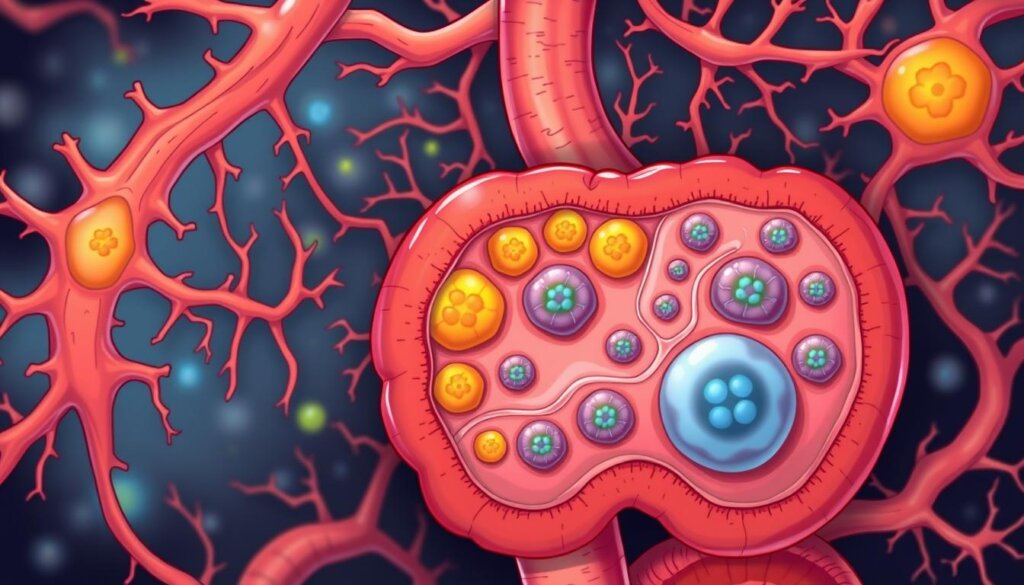
Functional Pancreatic NETs | Characteristics |
|---|---|
Gastrinomas | Tumors that cause increased stomach acid, ulcers, and diarrhea; most are malignant. |
Insulinomas | Usually, benign tumors form in cells producing insulin. |
Glucagonomas | Tumors that form in cells produce glucagon, causing hyperglycemia; most are malignant. |
VIPomas and Somatostatinomas | Other rare types of functional pancreatic NETs. |
In summary, islet cell carcinoma or pancreatic neuroendocrine tumors are a unique type of pancreatic cancer. Knowing about them is key to recognizing symptoms and getting the right medical care.
Types of Islet Cell Tumors
Functional Islet Cell Tumors
Islet cell tumors make different hormones. These hormones cause various symptoms. They come from different cells, like insulin, glucagon, gastrin, somatostatin, VIP, and ACTH.
Insulinomas are the most common, making up about 70% of cases. They make insulin and can cause low blood sugar. Glucagonomas and gastrinomas are often cancerous, but insulinomas are usually not.
New ways to find and study these tumors have helped a lot. Tools like FDG-PET, diffusion-weighted MRI, and endoscopic ultrasound-guided methods are key. Surgery and other treatments, like endoscopic ultrasound-guided ethanol ablation and radiofrequency ablation, are also effective.
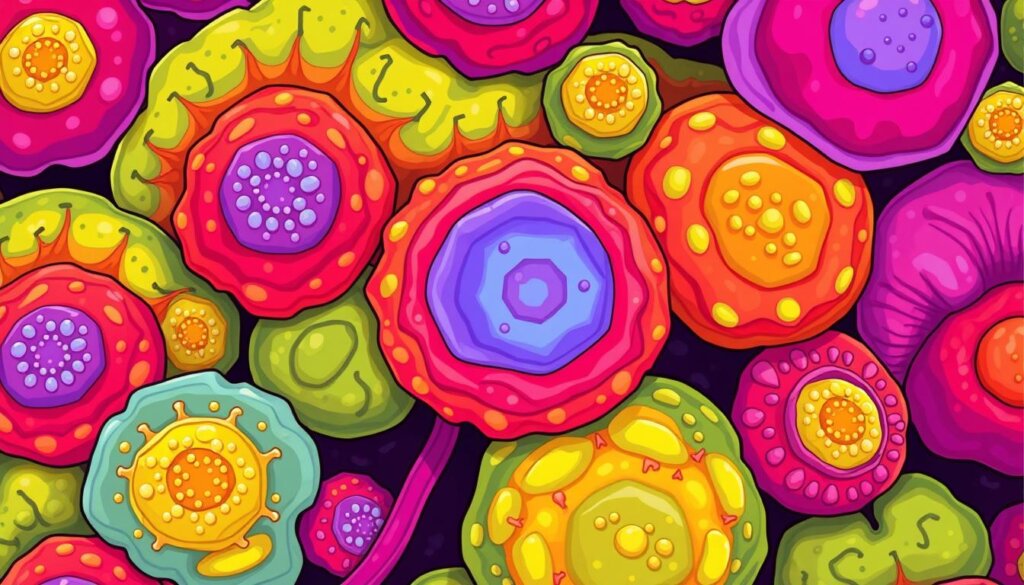
“Advances in diagnostic techniques and treatment options have significantly improved the management of functional islet cell tumors.”
Symptoms of Islet Cell Carcinoma
Islet cell tumors can cause different symptoms. This depends on whether they are functional or non-functional.
Non-functional Tumor Symptoms
Non-functional tumors don’t make too much hormone. But they can still cause problems. Symptoms include diarrhea, indigestion, and a lump in the belly.
They can also cause back or belly pain and jaundice.
Functional Tumor Symptoms
Functional tumors make too much hormone. This leads to specific symptoms. For example, gastrinomas can cause stomach ulcers and pain.
Insulinomas can lead to low blood sugar. Glucagonomas can cause a skin rash and high blood sugar.
VIPomas can cause watery diarrhea and dehydration. Carcinoid tumors can trigger carcinoid syndrome.
The symptoms of islet cell carcinoma vary. This depends on the tumor type and hormones it makes.
Tumor Type | Excessive Hormone Produced | Symptoms |
|---|---|---|
Gastrinoma | Gastrin | Stomach ulcers, abdominal pain |
Insulinoma | Insulin | Low blood sugar, feeling tired, shaking, headache, hunger |
Glucagonoma | Glucagon | Skin rash, high blood sugar |
VIPoma | Vasoactive intestinal peptide (VIP) | Watery diarrhea, dehydration |
Carcinoid Tumor | Serotonin | Flushing, valvular disease, diarrhea |
It’s important to know the symptoms of islet cell carcinoma. This helps with early diagnosis and treatment.
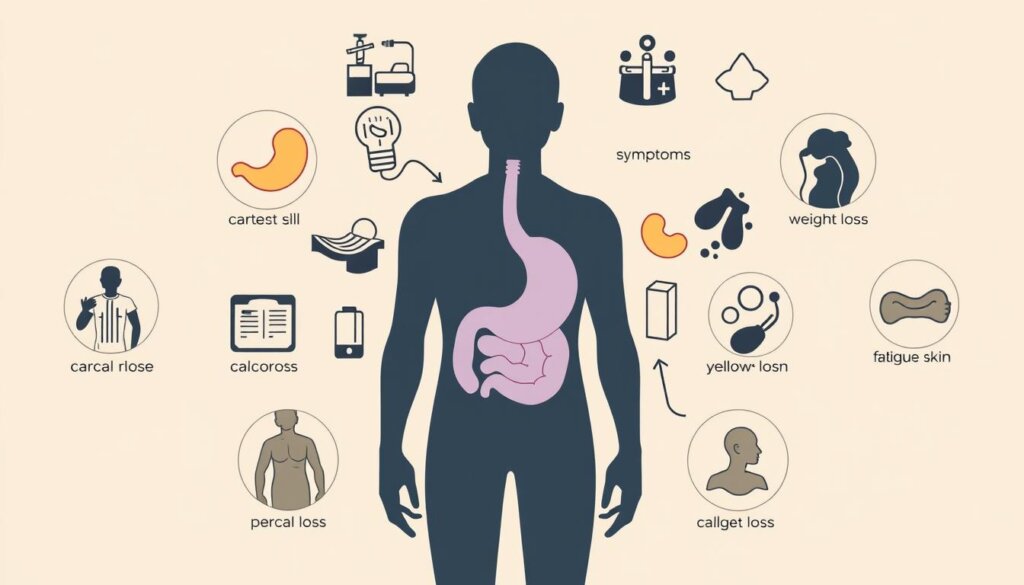
Diagnosis of Islet Cell Carcinoma
Diagnosing islet cell carcinoma, a rare pancreatic tumor, needs a detailed check-up. This includes blood and urine tests, biopsy, biomarker tests, and imaging tests. These help understand the tumor’s type and how it acts.
The first step is to check hormone levels in blood and urine. Tests for chromogranin A and neuron-specific enolase are key. They show if the tumor is functional or non-functional.
Imaging tests like CT scans, MRI, and PET-CT scans are also vital. They help find and size the tumor. These tests guide the treatment plan.
A biopsy is often needed for a clear diagnosis. It can be done through fine needle aspiration or surgery. This step confirms the diagnosis and helps plan treatment.
Endoscopic ultrasound is another useful tool. It helps check pancreatic masses and guide biopsies. This method lets doctors closely examine the tumor and its surroundings.
By using these diagnostic tools together, doctors can accurately diagnose islet cell carcinoma. They can then create a treatment plan for the patient.
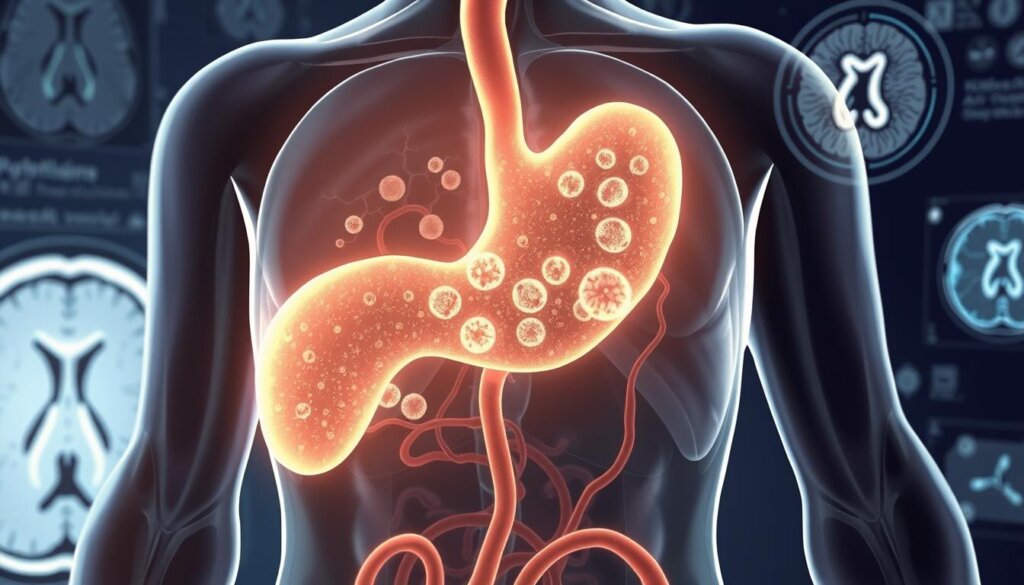
Treatment Options for Islet Cell Carcinoma
If you’ve been diagnosed with islet cell carcinoma, your treatment plan will depend on several factors. These include the type, stage, and location of your tumor, as well as your overall health. Surgery to remove the primary tumor and any metastases is often the first choice. Sometimes, minimally invasive laparoscopic surgery may be an option.
Other treatments may also be used, either alone or with surgery. These include:
- Chemotherapy: Drugs like doxorubicin, streptozocin, fluorouracil (5-FU), temozolomide, and capecitabine are commonly used to treat islet cell carcinoma.
- Radiation therapy: High-energy beams, such as X-rays, are used to kill cancer cells.
- Targeted therapy: Medications like belzutifan, everolimus, and sunitinib target specific molecules in cancer cells.
- Hormone therapy: This treatment aims to control the excess hormone production associated with functional islet cell tumors.
- Hepatic arterial occlusion or chemoembolization: These procedures restrict the blood supply to liver tumors, potentially shrinking them.
- Ablation therapy: This uses energy waves to destroy cancer cells, such as radiofrequency ablation.
Your healthcare team will work with you to develop the most appropriate treatment plan.
“The key to successful treatment of islet cell carcinoma is a multidisciplinary approach, involving the expertise of oncologists, surgeons, and other specialists.” – Dr. Emily Ramsey, Oncologist
Role of the Interprofessional Team
Managing islet cell carcinoma needs a team effort. Healthcare providers work together. Oncologists plan the treatment. Endocrinologists handle hormone issues.
Radiologists read imaging tests. Pathologists check tissue samples. Nurses teach patients and manage symptoms. Pharmacists manage medicines, especially hormones.
The team works together for the best care. Each member brings their skills. They talk and plan to help the patient.
For example, the oncologist might give a special treatment. The endocrinologist checks hormone levels. The radiologist looks at scans to see how the tumor is doing.
The pathologist gives insights into the tumor. The nurse teaches patients and helps with side effects. The pharmacist checks medicines to keep the patient safe.
Together, the team gives the best care. This improves the patient’s life and chances for a good outcome.
Prognosis and Follow-up
The outlook for islet cell carcinoma changes a lot based on the tumor’s stage and grade. The SEER Program database shows that those with early disease can live up to 124 months. But, those with more advanced disease have much shorter lives, at 70 and 23 months, respectively. Factors like the tumor’s stage, location, and when it was found also play a big role in survival.
Even though islet cell carcinomas are often slow-growing, those with late-stage disease face a grim outlook. They usually only live for about 2 years. But, there’s good news: survival rates are getting better, especially for those with distant stage pancreatic neuroendocrine tumors.
People with islet cell carcinoma need to see their doctors often to check for any signs of the disease coming back. Regular scans and blood tests to check hormone levels are key. The exact schedule and tests will depend on the patient’s situation and treatment plan.
In short, the future for islet cell carcinoma patients is uncertain and depends on the tumor’s stage and grade. It’s vital to keep up with regular scans and blood tests to watch for any signs of the disease coming back.
Survival Rates for Islet Cell Carcinoma | Median Survival (Months) |
|---|---|
Localized Disease | 124 |
Regional Disease | 70 |
Distant Disease | 23 |
Prevention and Risk Factors
Most pancreatic neuroendocrine tumors, like islet cell carcinoma, happen by chance. But some genetic syndromes can raise your risk. People with MEN1, VHL disease, NF1, and tuberous sclerosis should get checked often.
Some lifestyle and environmental factors might also increase your risk. Smoking, drinking too much alcohol, and chronic pancreatitis can raise your risk. Also, having a family history of cancer or type 2 diabetes can play a part.
We still don’t know all about islet cell carcinoma’s causes. But research keeps looking into risk factors and ways to prevent it. Knowing more about the disease helps doctors find it early and improve treatment.
Risk Factor | Description |
|---|---|
Genetic Syndromes | People with MEN1, VHL, NF1, and tuberous sclerosis face a higher risk. They should be checked regularly. |
Lifestyle Factors | Smoking, drinking too much, and chronic pancreatitis can increase your risk. |
Family History | Having a family history of cancer can raise your risk of islet cell carcinoma. |
Medical Conditions | Type 2 diabetes and other conditions can also increase your risk. |
“By understanding the genetic and environmental factors associated with this disease, healthcare providers can work to develop more effective screening and early detection protocols, ultimately improving outcomes for those at risk.”
There’s no known way to prevent islet cell carcinoma. But regular checks for those at risk can help catch it early. Research keeps looking into how genes, lifestyle, and environment affect this rare cancer.
Conclusion
Islet cell carcinoma is a rare and complex form of pancreatic cancer. It needs a team effort for diagnosis and management. The average age of diagnosis is 59 years. Survival can change a lot based on age, race, and use of palliative care.
While survival rates are getting better, more research and new treatments are needed. This will help improve care and results for those with this condition.
Diagnosing islet cell carcinoma involves biochemical tests, imaging, and biopsies. Nonfunctional tumors often don’t show symptoms until they grow big. Functional tumors can cause hormonal symptoms.
Treatment usually includes surgery. Chemotherapy, radiation, and targeted therapies are used when needed.
Working together is key for a good outcome. An interprofessional team, including oncologists and surgeons, is essential. Understanding islet cell carcinoma’s unique challenges helps healthcare teams provide better care.
FAQ
What is islet cell carcinoma?
Islet cell carcinoma is a cancer that starts in the pancreas. It comes from the neuroendocrine cells. These are also called pancreatic neuroendocrine tumors (PNETs) or islet cell tumors of the pancreas.
What are the different types of islet cell tumors?
There are two main types of islet cell tumors. Functional tumors make too much of certain hormones. Non-functional tumors don’t make these hormones.
Functional tumors can make insulin, glucagon, gastrin, somatostatin, vasoactive intestinal peptide (VIPoma), or adrenocorticotropic hormone (ACTH-secreting tumors).
What are the symptoms of islet cell carcinoma?
Symptoms depend on the type of tumor. Non-functional tumors can cause diarrhea, indigestion, and abdominal pain. They can also cause jaundice.
Functional tumors cause symptoms based on the hormones they make. For example, gastrinomas can cause stomach ulcers and pain. Insulinomas can cause low blood sugar. Glucagonomas can cause a skin rash and high blood sugar. VIPomas can cause watery diarrhea.
How is islet cell carcinoma diagnosed?
Doctors use several tests to diagnose islet cell carcinoma. They check hormone levels and use imaging tests like CT scans and MRIs. They also do biopsies to confirm the diagnosis and grade the tumor.
What are the treatment options for islet cell carcinoma?
The main treatment is surgery to remove the tumor and any spread. Other treatments include chemotherapy, radiation, and hormone therapy. The choice depends on the case.
What is the role of the interprofessional team in managing islet cell carcinoma?
A team of healthcare providers works together to manage islet cell carcinoma. This team includes oncologists, endocrinologists, and others. Each member helps ensure the patient gets the best care.
What is the prognosis for islet cell carcinoma?
The outlook for islet cell carcinoma depends on the tumor’s stage and grade. Survival rates have improved, especially for tumors that have spread. Patients need regular check-ups to watch for any changes.
Are there any known risk factors or prevention strategies for islet cell carcinoma?
Most pancreatic neuroendocrine tumors happen by chance. However, some genetic syndromes can increase the risk. People with these conditions should be checked regularly. There are no known ways to prevent islet cell carcinoma.
